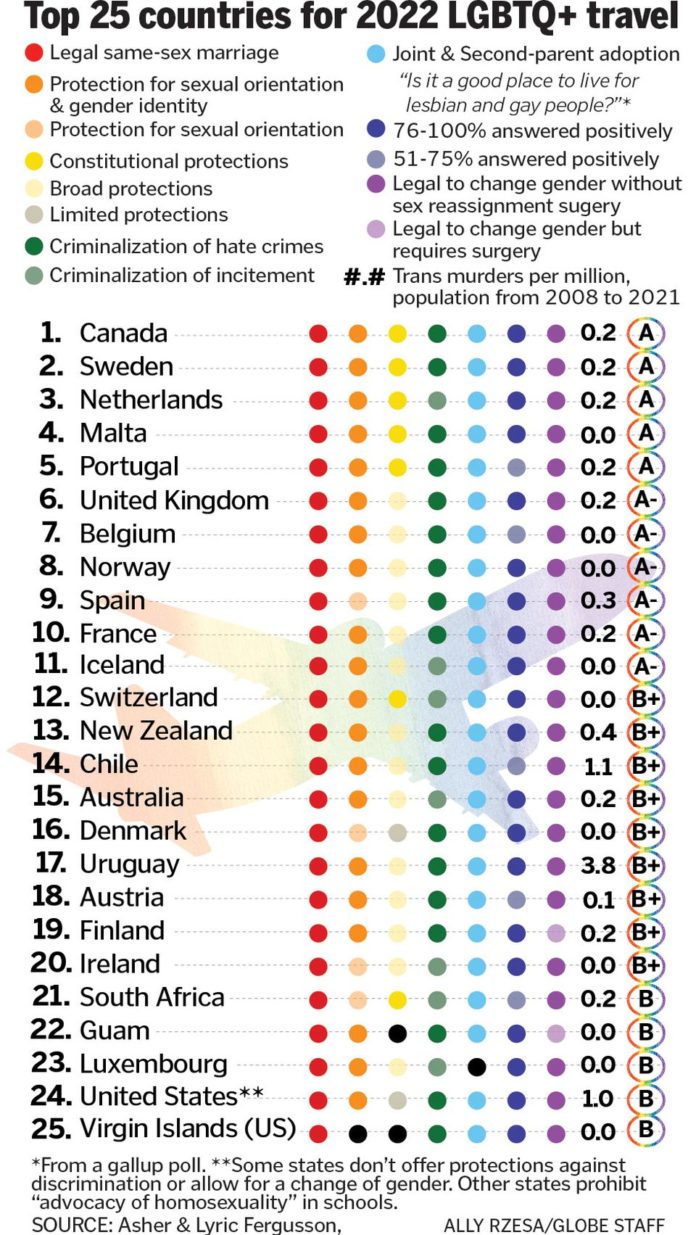Even Asher Fergusson, who spent hundreds of hours researching the best and worst countries for LGBTQ+ travelers, was surprised by the results of his LGBTQ+ Travel Safety Index.
Fergusson, a travel enthusiast and self-described “data geek,” crunched the numbers and analyzed laws, surveys, and even murder rates to rank 203 countries with the safety of LGBTQ+ tourists in mind. Looking at 10 factors such as gay marriage, constitutional protections, adoption rights, quality of life surveys, and transgender identity laws, Fergusson and academic researcher Eliot Assoudeh determined that Canada is the best country for LGBTQ+ travelers. Canada is followed by Sweden, the Netherlands, Malta, and Portugal.
Advertisement

The United States ranked No. 24 on the list, coming in behind many European countries because several states are either considering or have passed anti-trans bathroom bills or have banned transgender student athletes from competing in sports. So far this year, the Human Rights Campaign, the largest gay political lobbying organization in the country, has tracked 24 anti-LGBT bills that have passed into law in 13 states.
“It’s sometimes hard for people to remember that the US is a huge country with enormous diversity,” he said. “This study is looking at the country as a whole. A No. 24 ranking makes sense when you consider states like Florida, where teachers are banned from discussing sexual orientation and gender identity in class.”
But the rankings that most surprised Fergusson were those of several Caribbean islands, particularly Jamaica, where gay sex is a criminal offense and can result in 10 years in prison and hard labor. Gay “indecent behavior” can result in seven years in prison. The popular tourist spot ranked 188 out of the 203 countries surveyed and earned an F.
“A few years back, Jamaica was named the most homophobic place on earth by Time magazine,” he said. “It’s just crazy how intense it can be and how much violence there is against the LGBTQ+ community. Many people think of Jamaica as a no worries, laid-back destination. But it’s definitely not that way for everyone.”
Advertisement
It’s not just Jamaica that ranks poorly for gay travelers in the Caribbean. Gay sex in Barbados can result in life in prison. “Serious indecency,” which is defined by any homosexual act, could result in 10 years in prison. St. Lucia, one of the most popular honeymoon destinations in the Caribbean, also has strict laws against gay sex.

“That said, being gay or lesbian is not always frowned upon in tourist-heavy areas in some countries,” Fergusson added. “Those travelers are welcomed. So certain destinations may be safe and friendly if you go to the right hotel and tourist area. I think no matter what, doing extensive research on the destination you want to visit is really important.”
Whether or not safety is an issue, some LGBTQ+ travelers don’t want to support countries that lack protections or can be dangerous for its residents.
Other Caribbean countries that earned an F in the study include Antigua and Barbuda, where being gay is illegal and can result in life in prison. St. Vincent and the Grenadines, and Dominica also scored an F. The Dominican Republic and several other Caribbean destinations earned a D.
Many bottom-ranking countries in his LGBTQ+ Travel Safety Index are in the Middle East, such as Kuwait, Saudi Arabia, Afghanistan, and Qatar. Penalties in these countries for homosexuality range from flogging to death.
Advertisement
In addition to examining laws, protections, and morality codes, Fergusson added trans legal identity laws and the trans murder rates to his study. The US Department of State has a helpful website for LGBTQ+ travelers that also offers in-depth advice for transgender travelers.
Another simple but effective piece of information that he used in collecting data for the study was an annual Gallup poll that asks the residents of 110 countries if their area is a “good place” for gay and lesbian people to live. Across many parts of the globe, that impression has become increasingly positive, including in the United States, where 80 percent of respondents said their area is a good place for LGBTQ+ people to live.
The Gallup poll, Fergusson’s LGBTQ+ Travel Safety Index, and the Global Acceptance Index, which is collected by the Williams Institute, a think tank at UCLA Law, all find that the most accepting parts of the world for the LGBTQ+ community (apart from Canada) are Nordic countries and Western Europe.
But Fergusson stresses that no matter where you go, it’s essential for LGBTQ+ travelers to research before packing their bags.
“While attitudes are changing in many countries, it’s a good idea to research the country’s laws,” he said. “In many cases, the laws have not yet caught up to the sentiment of the population.”
Christopher Muther can be reached at christopher.muther@globe.com. Follow him on Twitter @Chris_Muther and Instagram @chris_muther.








